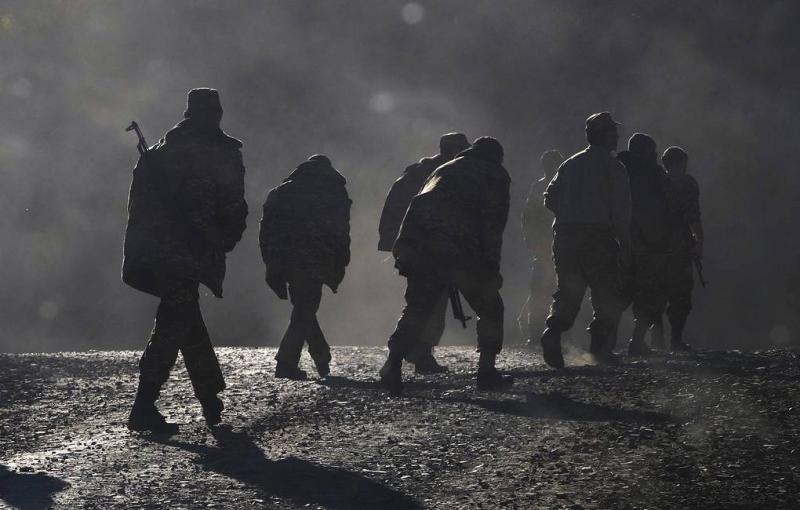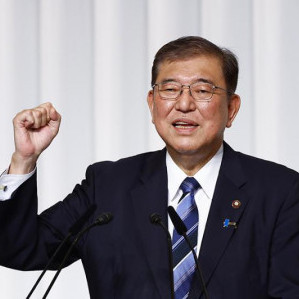
© AP Photo/TASS
Top stories from the Russian press on Monday, August 29th, prepared by TASS
Nezavisimaya Gazeta: Zaporozhye plant dilemma worries entire world
The International Atomic Energy Agency (IAEA) has compiled a group of experts who would visit the Zaporozhye nuclear power plant. Earlier, IAEA Director General Rafael Grossi warned of a disaster at the nuclear facility on the battle line now. Meanwhile, the situation around the power plant could cause a foreign policy scandal, now that the Review Conference of the Parties to the Treaty on the Non-Proliferation of Nuclear Weapons (NPT) failed to adopt a concluding document. It was blocked by Russia who, among other things, protested against the proposal to have the Ukrainian authorities control the NPP.
According to the New York Times, the group of IAEA experts will be made up of 14 officials, including Grossi. The IAEA tried to prevent either Russia or Ukraine from claiming that the group is lopsided. Representatives of Serbia and China will be among the experts for Moscow’s sake, while Polish and Lithuanian delegates should please Kiev. The other members come from France, Italy, Albania, Jordan, Mexico and North Macedonia. Russia could - and it is highly likely to - challenge the list of experts, at least because France, Italy and North Macedonia have been supplying weapons to Ukraine.
And yet the IAEA might have failed to come up with an absolutely neutral mission, should it have set such a goal, with the number of countries officially approving of Russia’s activities in Ukraine or at least not criticizing them is small globally, and in Europe it is confined to Belarus only. However, it is impossible not to include Europeans into an expert mission, since a potential disaster at the Zaporozhye NPP would hit Europe first.
Chief Research Fellow at the Institute for the US and Canadian Studies at the Russian Academy of Sciences Vladimir Batyuk recalls that this was the second time that the NPT Review Conference ended without adopting an outcome document. "It has become a trend. Thank God they agreed to hold the next conference at all - it will be convened in 2026," the expert told Nezavisimaya Gazeta.
According to Batyuk, the Review Conference dealt another blow to the non-proliferation regime which could have major consequences in the future. "Some countries, not rogue states, but very serious and powerful players, might get ever more tempted to have their own nukes," he warns, referring to Japan and South Korea. As neighbors of a new and not quite predictable nuclear power, North Korea, both are becoming increasingly worried over their own security and both have major research potential, too, the expert noted. Therefore, the conflict in Ukraine could blow up the global nuclear safety system that has been in place since the Cold War ensuring that the nuclear powers club does not expand without any control, he argues.
Kommersant: Brussels seeking to squeeze Moscow out of Armenian-Azeri peace process
On Tuesday, the deputy prime ministers of Armenia and Azerbaijan will hold a joint meeting on border delimitation and border security in Moscow, and on Wednesday, a more important event will take place in Brussels, where the two countries’ leaders, Nikol Pashinyan and Ilham Aliyev, will meet with European Council President Charles Michel as a mediator. While the Moscow talks are meant to discuss the implementation of technical agreements, the issue of whether Yerevan and Baku are ready to sign a peace treaty that could end their 30-year-old conflict will be on the agenda in Brussels.
Both meetings will be held in the wake of increased tensions in the conflict zone between Armenia and Azerbaijan seen in August.
Last week’s phone call between Armenian PM Nikol Pashinyan and Russian President Vladimir Putin failed to defuse tensions in Yerevan. In his address on the 32nd anniversary of Armenia’s independence, Pashinyan complained that the international entities authorized to guarantee the country’s security had been cracking, with the first of those cracks on the Nagorno-Karabakh issue. He may have been hinting at the OSCE Minsk Group here, Kommersant writes. And Azerbaijan is not happy with the November 2020 tripartite agreements being stalled. "Yerevan has been desperate to shift dialogue towards the OSCE Minsk Group which is dead for Baku," Rafik Ismailov, who heads the Baku-based center For Civil Society, told Kommersant.
Analysts in Yerevan told Kommersant that the situation ahead of the new rounds of talks in Moscow and Brussels has not been in Armenia’s favor. Political scientist Benyamin Poghosyan told the newspaper that the events of early August showed that Baku, being more powerful militarily, could force Yerevan to agree to its terms, and also, all the major countries involved in the South Caucasus - these include Russia, the EU, the US, Iran and Turkey - saw anew that the Armenian community and government are ready to cede their territories again.
According to Poghosyan, the European Union that claims the role of a mediator, just like the United States, is seeking to find such a solution that would envisage the withdrawal of Russian peacekeepers from Karabakh after November 2025, when their five-year mandate expires. "Hence, the EU would like Yerevan and Baku to agree in Brussels to an autonomous status for Karabakh as part of Azerbaijan so that the parameters of this autonomy could be discussed afterwards," the expert explained.
Izvestia: Russia conducting breakthrough hypersonic training to ferret out enemy targets
MiG-31BM pilots have been undergoing training to find targets at altitudes of 10,000 meters above ground. Despite the fact that Russia is the only country that possesses supersonic weapons, it is high time to start learning to counteract them. If the MiG-31 interceptors are taught to search for hypersonic targets and detect them in a timely manner, Russia’s defenses against potential threats would strengthen radically.
"Up-to-date missiles fly at a very high speed that exceeds the speed of sound by two to three times," honored military pilot Igor Malikov told Izvestia. "Being able to destroy those is important now like never before. Also, everyone who can, has been trying to build supersonic weapons of late, and Russian crews should learn how to intercept such targets," he said. According to Malikov, MiG-31BMs are ideal for solving these tasks and are very promising machines.
MiG-31 aircraft can both find supersonic weapons and use them in combat. Izvestia was told earlier that the Russian Defense Ministry had decided to make the MiG-31I the main carrier of Kinzhal hypersonic missiles. The first prototypes of the MiG-31I have already been tested. In particular, they were involved in strategic maneuvers held early this year.
The country’s top brass reported earlier this month that three aircraft equipped with Kinzhal hypersonic missiles had been deployed at Chkalovsk Airfield in Russia’s Baltic exclave of Kaliningrad. During the flight there, interaction with fighter jets of the 6th Air Force Army and the Baltic Fleet’s air defenses and naval aviation was successfully tested, the Defense Ministry said.
On August 21, Defense Minister Sergey Shoigu said the Russian armed forces had used Kinzhal missiles in the special military operation in Ukraine three times and each time, they proved very effective, he added. According to the Defense Ministry, the missiles were used to hit an underground Ukrainian command post and to destroy an underground ammunition depot and a fuel storage facility there.
Vedomosti: Kazakhstan imposes moratorium on weapons exports
On August 27, Kazakhstan, a fellow member with Moscow in the Collective Security Treaty Organization, announced a year-long moratorium on weapons exports. Analysts agree that the reason behind the decision was to prevent any sort of a scandal around ammo deliveries to Ukraine from Kazakhstan via third countries.
A source close to Russia’s secret services confirmed to Vedomosti that Central Asian countries had been reexporting Soviet samples of armaments, indeed. According to the source, earlier, attempts on the part of the US and the UK were registered to buy ammunition for Ukrainian forces from Kazakhstan and other regional countries. That being said, Moscow has fought such transactions.
Kazakh defense enterprises manufacture a wide range of weapons, in cooperation with foreign companies, too. Specifically, the Tarlan rocket system, the Saryshayan multiple launch rocket system, the Barys 8x8 armored carrier and the Arlan armored vehicle are produced in the country, and Kazakhstan has also been modernizing Soviet T-72 tanks.
The latest decision by Kazakhstan could have come from a Sochi meeting between Russian President Putin and his Kazakh counterpart Kassym-Jomart Tokayev on August 19, when Moscow shared its concerns over a potential channel for reexporting armaments via third countries to Ukraine, according to Senior Researcher at the IMEMO Center for Post-Soviet Studies Stanislav Pritchin.
The authorities in Kazakhstan might have decided to officially thwart potential weapons supplies to Ukraine so as not to complicate the country’s relations with Russia, Pritchin said. With the Ukrainian issue being a key sticking point for Russia, Kazakhstan can only heed Moscow’s concern, despite a tough period in bilateral relations currently, the expert believes.
Also, Kazakhstan is seeking to weather the "conflict period" globally so as not to be accused of supplying armaments to any conflicting sides, chief Researcher at the Moscow State Institute of International Relations and professor with the Higher School of Economics Andrei Kazantsev told Vedomosti. And the latest tensions between China and the US might have influenced Kazakhstan’s decision, too, he said. So, the position is unlikely to be reviewed in the next few years.
Izvestia: Will the FBI’s Mar-a-Lago raid dash Trump’s presidential plans for 2024
The recent raid on Donald Trump’s estate in Mar-a-Lago and other investigations against the former US president would not prevent him from running for the 2024 election, US experts told Izvestia. The billionaire stands a good chance of running for presidency, they say.
The latest and the most high-profile case of late was on August 8, when FBI officers confiscated 26 boxes of items, including 11 sets of classified documents, from Trump’s estate. Michael O’Hanlon, a senior fellow and director of research in Foreign Policy at the Brookings Institution, told Izvestia that the potential charges could be serious, however the expert doubted the former US leader could have shared nuclear or other super-classified information with hostile countries.
The searches in Mar-a-Lago hardly affected either the ex-president’s supporters, who have been very loyal to Trump, or those US citizens who would stick to their opposition to Trump in any case, Saeed Khan from Wayne State University told Izvestia.
Despite the number of criminal cases opened against Trump, there is currently no obstacle for him to running for reelection, Professor at the Higher School of Economics’ Faculty of Law Alexander Domrin noted. Though Trump has not officially announced yet that he would run, he will certainly do so after the November 8 midterm election where the Republicans are bound to triumph. And no probes can do him any harm now, he said.









